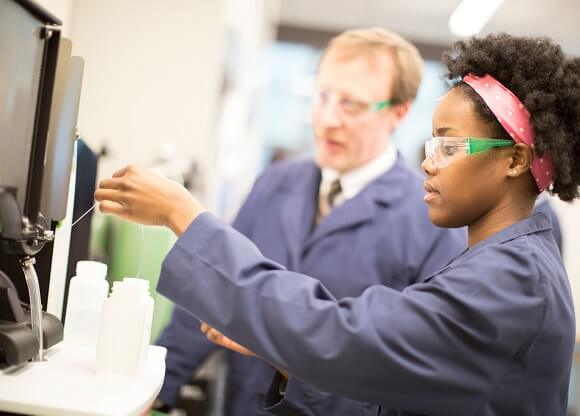
School of Engineering features technologically advanced facilities
April 25, 2018

April 25, 2018

Civil engineers must understand the many forces at work underneath and all around our communities. From our hydraulics and environmental workshops to our soil and concrete lab, our facilities teach our students to do exactly that.
The equipment our students use provides a hands-on understanding of the principles of aerodynamics, hydro pressure, structural and environmental engineering and beyond. This includes a simulator that illustrates river morphology and contamination; an atomic absorption spectrometer for analyzing harmful metals found in soil samples; and Triaxal machine for performing geotechnical testing.
The Industrial Engineering Room, the collaborative heart of our industrial engineering program, is an interactive and interchangeable space that reflects a variety of complex work environments, from a factory floor to the central storage facilities of a major hospital.
Here, students learn to identify and address issues in workflow and production; improve workplace performance and safety; and successfully mitigate wasteful and costly practices. The Industrial Engineering Room features some of the most advanced equipment in engineering education — from demonstrating how to examine and manipulate the moving parts of an automated assembly line to how human decisions on the road impact safety and efficiency, particularly those made by fleet drivers and others responsible for transporting materials, products and people from one point to another.
From the lathes and mills found in the machine shop, to the laser cutter workshop's high-powered Vytek 200W CO2 laser, our program's teaching equipment is immaculate and state of the art. Each piece of technology emphasizes principles in action — such as the air conditioning system trainer in our Thermal Heat and Transfer Lab, which illustrates the inner-workings of a large A/C unit and what it takes to overload it.
Beyond metals, machinery and energy transfer, a large part of our curriculum focuses on design, fabrication and precision. Our 3D Printing Room is equipped with FDM and PolyJet printers necessary to bring your ideas to life. In our Circuits Lab, you'll cover more of the finer skills required of mechanical engineers. Here, you will work with the same detailed circuitry that powers a range of everyday consumer items, from motors and computers to guitar amplifiers and electric toothbrushes.
Students have the unique opportunity to not only gain invaluable knowledge by working in the lab, you'll also have the opportunity to collaborate with peers enrolled in other engineering programs. This full circle approach will give you the hands-on experience you'll need while gaining an understanding of how engineers from different disciplines work together for positive results.
Our students utilize programs that feature active, collaborative classrooms that support multiple teaching and learning styles, and feature the same powerful software and tools used by professionals. Our facilities enable our students to bring robots to life, explore in a sandbox-style space and better understand cyber security and security breaches.
Quinnipiac Today is your source for what's happening throughout #BobcatNation. Sign up for our weekly email newsletter to be among the first to know about news, events and members of our Bobcat family who are making a positive difference in our world.
Sign Up Now